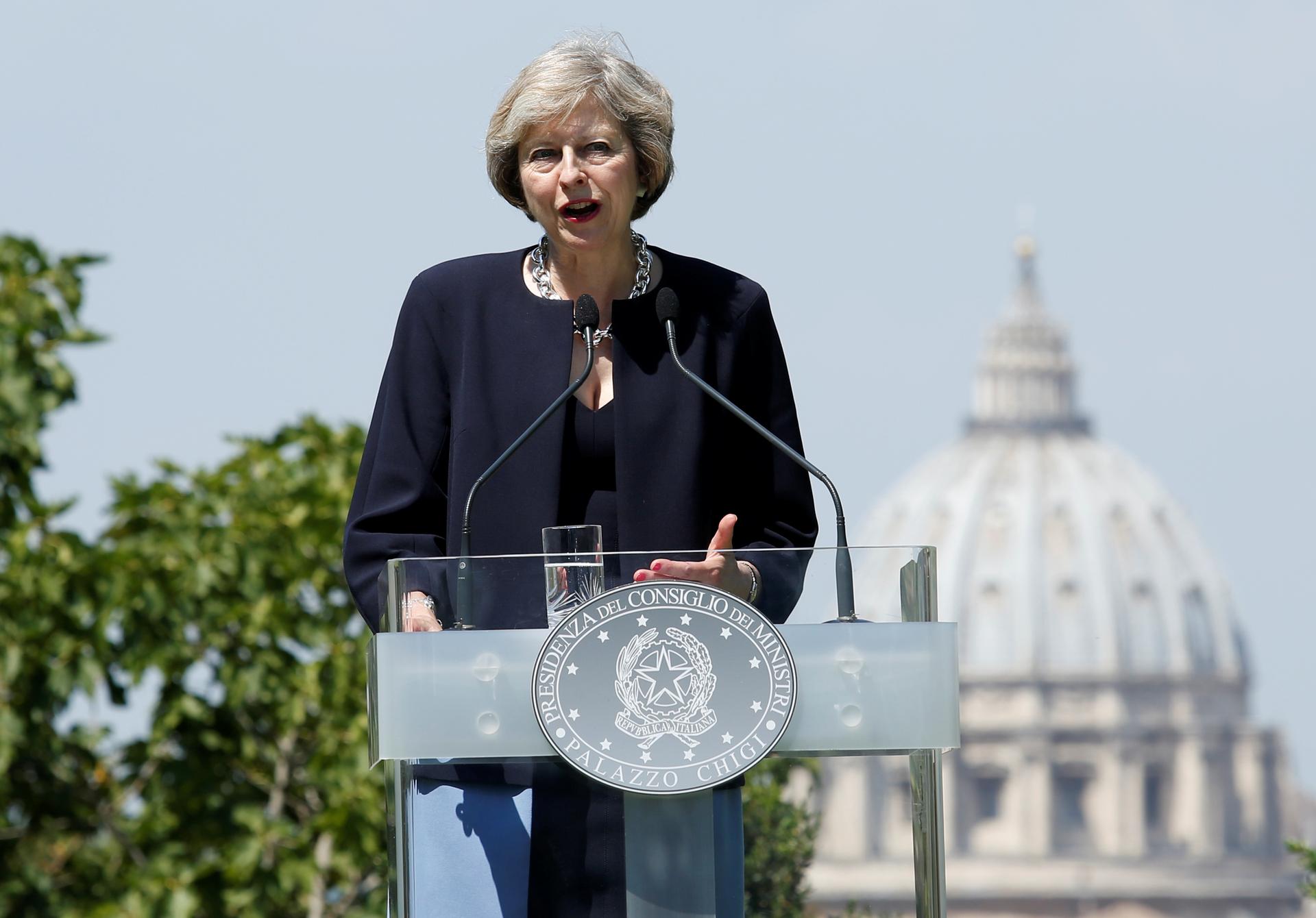Watch live: Trump hosts first foreign leader — UK Prime Minister Theresa May — to his White House
British Prime Minister Theresa May speaks during a news conference with her Italian counterpart Matteo Renzi (not seen) during a meeting in Rome, Italy.
President Donald Trump makes his debut as a statesman Friday, welcoming British Prime Minister Theresa May as the first foreign leader to visit his White House.
The meeting will be a pivotal moment in trans-Atlantic relations, which have been rocked by Trump's election and his willingness to rethink NATO, the UN and other foundation blocks of the liberal world order.
Watch the Trump-May press conference, which starts at 1 p.m. EST live here (and read on for more information):
May's trip is part influence campaign and part charm offensive.
She is expected to give Trump an engraved quaich — a ceremonial cup exchanged by Scottish highland chiefs — in a nod to Trump's Scottish ancestry. His mother was born on the island of Lewis.
For First Lady Melania Trump, May will gift a hamper of apple juice, damson plum jam, marmalade, Bakewell tarts and cranberry and white chocolate shortbread cookies.
But aside from the desserts, the meeting will have a meaty main course.
May hopes to win the neophyte president's support for collective security arrangements that have underpinned European security since World War II.
Trump has decried NATO as "obsolete" and expressed a willingness to befriend Russia's Vladimir Putin — two positions that deeply concern European leaders from London to Lisbon.
Much of Britain's military power, including its nuclear deterrent, depends on US equipment and systems.
In private, European diplomats fret about the influence of top Trump adviser Steve Bannon, who has made common cause with right-wing nationalists and populists in France, Britain and beyond.
Shortly after his election, Trump met with right-wing British politician Nigel Farage, who has made dismantling the European Union his life's work.
Post-Brexit trade
But Trump's break with decades of US support for multilateral trade deals and his preference for bilateral accords could be manna for May, who is struggling to negotiate Britain's complex exit from the European Union.
Faced with exit from the European single market, the British government is scrambling to secure bilateral deals around the world.
Netting a commitment from Trump for a US-UK agreement would be a major coup and help justify her visit to British voters.
May is hoping the prospect of a US deal — while complicated — will also help dispel fears among a divided public that Britain may be economically worse off by leaving Europe's single market.
Her decision to meet Trump just one week after his inauguration has caused controversy at home. Trump has been condemned by European politicians of all stripes for his comments about women, Muslims and the use of torture.
May was not helped Thursday when the White House misspelled her name multiple times when announcing her visit.
The reserved daughter of a vicar has promised to be "frank" in her dealings with the unpredictable billionaire, and laughed off questions about their personal compatibility.
"Haven't you ever noticed that sometimes opposites attract?" she told reporters on her plane.
The pair will meet at the White House and hold a joint press conference before a working lunch.
May began her day Friday with a visit to Arlington National Cemetery, the final resting place of a number of British soldiers who died fighting alongside US forces in various wars.
Throughout the long US election campaign, Trump showed little interest in foreign policy except through the prism of his image at home and a pledge to put "America First."
His first week in office has been marked by a war of words with Mexico over the building of a border wall, and his vow to make Mexico pay for it.
On Thursday, Mexican Enrique Pena Nieto called off a planned trip to Washington in protest.
The right stuff
May arrived in the United States on Thursday and received a rapturous welcome from Republican lawmakers gathering in Philadelphia with a speech urging them to "beware" of Russia, and warning US allies to "step up" and play a greater role in global security.
May hailed strong security ties between the two countries, and said their relationship had "defined the modern world."
Acknowledging rising tensions between the US and China, she said fears of the "eclipse of the West" would not be fulfilled if Britain and the United States continued to stand together.
May said NATO member states should contribute their fair share — a complaint made by the former and current US administrations — but defended the alliance from Trump's claims it was "obsolete."
May also defended the Iranian nuclear deal against the president's criticism, saying it was "vitally important" for regional security — but must now be properly enforced.
The prime minister had tough words on Trump's assertion that torture "absolutely" works, telling reporters that she condemned the use of illegal interrogation.
However, she won loud applause from Republicans when she praised Trump's victory, which he has compared to the anti-establishment feeling that drove the Brexit vote last June.
She met with Republican House Speaker Paul Ryan and discussed issues that included early efforts to forge a trade deal for when Britain leaves the European Union.
Every day, reporters and producers at The World are hard at work bringing you human-centered news from across the globe. But we can’t do it without you. We need your support to ensure we can continue this work for another year.
Make a gift today, and you’ll help us unlock a matching gift of $67,000!
